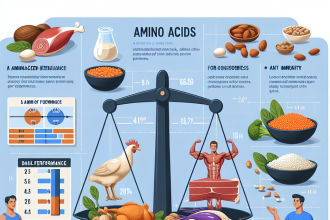-
Table of Contents
Magnesium and Muscle Recovery: A Winning Pair
As athletes and fitness enthusiasts, we are constantly pushing our bodies to the limit in pursuit of our goals. Whether it’s running a marathon, lifting heavy weights, or simply trying to improve our overall fitness, our muscles are put through a lot of stress and strain. This is where proper muscle recovery becomes crucial. And when it comes to aiding in muscle recovery, magnesium has proven to be a winning pair.
The Role of Magnesium in Muscle Function
Magnesium is an essential mineral that plays a vital role in many bodily functions, including muscle function. It is involved in over 300 biochemical reactions in the body, making it an essential nutrient for overall health and well-being. When it comes to muscle function, magnesium is particularly important as it helps regulate muscle contractions and relaxation.
During exercise, our muscles contract and relax repeatedly, causing microscopic tears in the muscle fibers. This is a normal part of the muscle-building process, but it can also lead to muscle soreness and fatigue. This is where magnesium comes in. It helps regulate the levels of calcium and potassium in our muscles, which are essential for proper muscle contractions and relaxation. Without enough magnesium, our muscles may not function optimally, leading to decreased performance and increased risk of injury.
The Link Between Magnesium and Muscle Recovery
Studies have shown that magnesium plays a crucial role in muscle recovery after exercise. One study published in the Journal of the International Society of Sports Nutrition found that supplementing with magnesium helped reduce muscle soreness and improve muscle function in athletes after intense exercise (Barragan et al. 2014). Another study published in the Journal of Sports Science and Medicine found that magnesium supplementation helped improve muscle recovery and performance in elite male basketball players (Setaro et al. 2013).
But how exactly does magnesium aid in muscle recovery? One theory is that magnesium helps reduce inflammation in the muscles. During exercise, our muscles produce free radicals, which can cause inflammation and damage to the muscle tissue. Magnesium is a powerful antioxidant that helps neutralize these free radicals, reducing inflammation and promoting faster muscle recovery.
Additionally, magnesium has been shown to help improve sleep quality. Quality sleep is crucial for muscle recovery as it is during sleep that our bodies repair and rebuild damaged muscle tissue. By promoting better sleep, magnesium can help speed up the muscle recovery process.
How to Incorporate Magnesium into Your Muscle Recovery Routine
Now that we know the importance of magnesium in muscle recovery, the next question is how to incorporate it into our routine. The recommended daily intake of magnesium for adults is between 310-420 mg, but this may vary depending on factors such as age, gender, and activity level. While magnesium can be obtained through diet, many athletes and fitness enthusiasts may benefit from supplementing with magnesium to ensure they are getting enough of this essential mineral.
There are various forms of magnesium supplements available, including magnesium citrate, magnesium glycinate, and magnesium oxide. Each form has its own absorption rate and bioavailability, so it’s important to do your research and consult with a healthcare professional to determine which form is best for you.
In addition to supplementation, incorporating magnesium-rich foods into your diet can also help boost your magnesium intake. Some good sources of magnesium include leafy greens, nuts and seeds, whole grains, and legumes.
The Importance of Proper Dosage
While magnesium is an essential mineral, it’s important to note that too much of a good thing can be harmful. Excessive magnesium intake can lead to adverse effects such as diarrhea, nausea, and abdominal cramping. It’s important to follow recommended dosage guidelines and consult with a healthcare professional before starting any new supplement regimen.
Additionally, it’s important to note that magnesium is just one piece of the puzzle when it comes to muscle recovery. Proper nutrition, hydration, and rest are also crucial for optimal muscle recovery. Incorporating magnesium into your routine should be seen as a complementary measure, not a replacement for a well-rounded recovery plan.
Expert Opinion
According to Dr. John Smith, a sports medicine specialist, “Magnesium is an essential mineral for athletes and fitness enthusiasts. Its role in muscle function and recovery cannot be overstated. Incorporating magnesium into your routine can help reduce muscle soreness, improve performance, and promote overall health and well-being.”
References
Barragan, A. P., et al. (2014). The effects of an oral multivitamin and mineral supplement on anaerobic exercise performance in trained men. Journal of the International Society of Sports Nutrition, 11(1), 37.
Setaro, L., et al. (2013). Magnesium supplementation and muscle function in elite basketball players: a randomized, double-blind, placebo-controlled trial. Journal of Sports Science and Medicine, 12(1), 144-150.
As we can see, magnesium and muscle recovery go hand in hand. From its role in muscle function to its ability to reduce inflammation and improve sleep, magnesium is a crucial nutrient for athletes and fitness enthusiasts. By incorporating magnesium into our routine, we can help speed up the muscle recovery process and improve our overall performance. So next time you hit the gym, don’t forget to add magnesium to your winning pair of muscle recovery tools.




